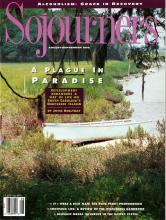Lou Reed once said of his live performances: "It's really like going to a concert. There's a lot coming at you and you've got to follow it....Some people don't want to be bothered with that -- it's not why they go to a 'rock 'n' roll show.'...They've got to follow it and it's got to be worth following."
Reed's newest release, Magic and Loss (Sire, 1992), is worth following. It's an inspiring requiem, written in tribute to two friends who died of cancer. The dramatic format requires that it be heard as a whole, and that is the way Reed performs it -- from start to finish, without interruption. Compelling in content, it is Lou Reed at his most demanding best.
From the "pure sound" introduction "Dorita (The Spirit)" to "Magic and Loss (The Summation)," every death-step of sickness, grief, anger, and inspiration is portrayed. The first song, "What's Good (The Thesis)," sets a toe-tapping tone with the lyrics "You loved a life others throw away nightly/...What's good?/Life's good/But not fair at all."
The "death's unfair" theme emerges repeatedly. In "Magician (Internally)": "So many things to do -- it's too early/For my life to be ending." In "No Chance (Regret)": "But your optimism made me think you really had it beat/So I didn't get a chance to say goodbye." In "Warrior King (Revenge)": "You are a violent messenger/and I'm not above your taunts." And then finally, in "Magic and Loss (The Summation)": "There's a bit of magic in everything/and then some loss to even things out."
Read the Full Article

